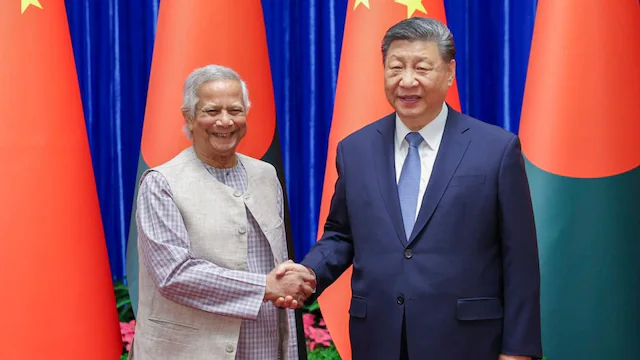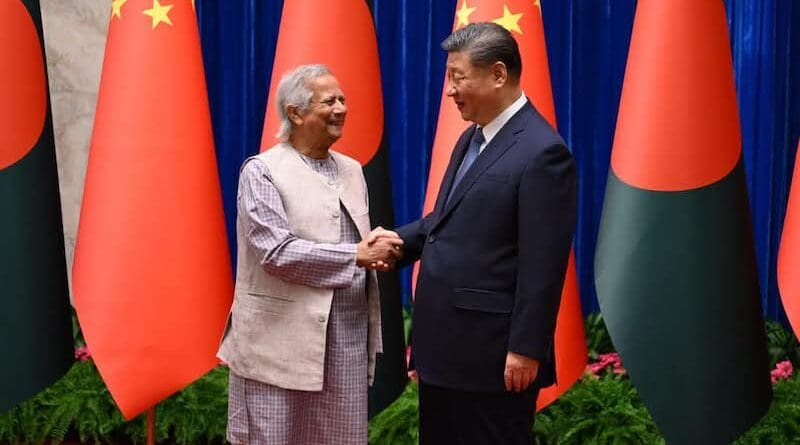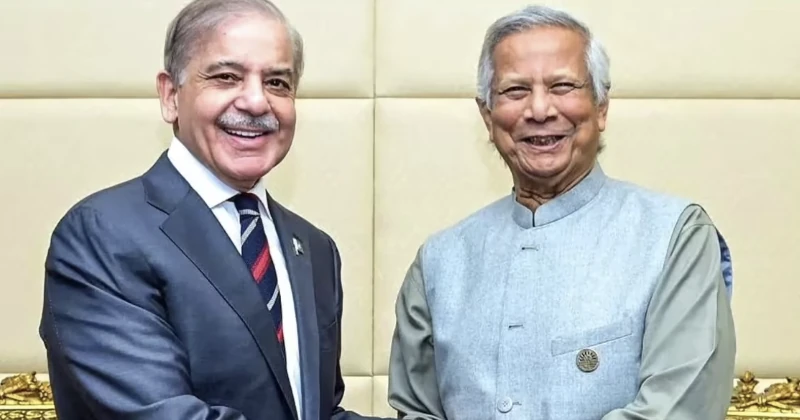
Bangladesh, a nation known for its vibrant democracy and dynamic political scene, currently finds itself embroiled in one of the most significant political upheavals of recent years. At the heart of this storm is none other than Mohammad Yunus — the Nobel laureate and visionary who revolutionized microfinance and social entrepreneurship. However, what seems like a personal crisis surrounding Yunus’ leadership and legacy is, in reality, a manifestation of a much deeper and complex political and geopolitical struggle.
Recent developments reveal that the crisis around Yunus is not an isolated domestic affair. Rather, it is intricately tied to the rising influence of China in Bangladesh, a relationship that has profound implications for the country’s political sovereignty, economic future, and regional alignments. This blog delves into the multifaceted dimensions of this political turmoil, examining the role of key local actors, China’s strategic ambitions, and the potential consequences for Bangladesh and the broader South Asian geopolitical landscape.
Bangladesh’s Political Landscape and the Unexpected Crisis of Mohammad Yunus
To understand the gravity of the current political upheaval, one must first appreciate the historical and political context in which it has unfolded. Mohammad Yunus, the founder of Grameen Bank, is a figure who commands immense respect both inside Bangladesh and globally. His pioneering microfinance model, which empowers the poorest women through small loans, has been hailed as a revolutionary approach to poverty alleviation.
Despite his overwhelming international acclaim, Yunus’ relationship with Bangladesh’s political establishment has often been complicated. His work transcends politics, yet inevitably intersects with the country’s power structures. For years, Yunus was seen as a non-partisan figure whose focus remained on social development rather than political gain. However, this image began to erode when political tensions and ideological differences emerged, especially with the ruling party led by Prime Minister Sheikh Hasina.
The crisis surrounding Yunus’ position escalated when reports surfaced of governmental pressures aimed at curtailing his influence. His role as a social reformer was increasingly seen as a challenge to entrenched political interests. Many analysts believe that his empowerment model, which promotes grassroots autonomy, was perceived as a threat to the centralized political machinery.
The catalyst for this crisis, however, was not just internal dissent. It was the growing shadow of China’s influence over Bangladesh’s political and economic affairs that added an international dimension to Yunus’ predicament. As Bangladesh became a key node in China’s ambitious Belt and Road Initiative (BRI), the country’s political environment underwent subtle yet profound changes.
The Strategic Interests of China in Bangladesh
China’s presence in Bangladesh has expanded significantly over the past decade, primarily through massive infrastructure projects such as highways, ports, and power plants funded by Chinese loans and investments. These initiatives are part of China’s grand strategy to extend its influence throughout Asia and beyond.
Bangladesh’s geostrategic location makes it a critical partner for China. Positioned near the Bay of Bengal, Bangladesh offers China access to maritime routes and regional markets. The development of the Payra Deep Sea Port and other infrastructure is designed to enhance connectivity and bolster China’s economic corridors linking South Asia with Southeast Asia.
However, this economic partnership is not without controversy. Critics argue that China’s loans often come with high interest rates and stringent terms, risking the financial stability of recipient countries. Furthermore, the economic dependency created through these loans could translate into political leverage, allowing China to influence policy decisions in these nations.
In this context, China’s political maneuvers within Bangladesh have become more assertive. Beyond infrastructure investments, China is believed to be engaged in cultivating relationships with influential political actors, attempting to sway public opinion and decision-making in ways that align with its interests.
The Interplay Between China’s Influence and Bangladesh’s Internal Politics
The crisis surrounding Mohammad Yunus offers a window into how China’s geopolitical ambitions can intersect with and exacerbate internal political conflicts in Bangladesh. Yunus, with his independent social mission, represents a potential obstacle to the state-centric models favored by China.
Bangladesh’s ruling Awami League under Sheikh Hasina has generally maintained a pragmatic approach toward China, welcoming investment and infrastructure support. Yet, this alliance also complicates internal politics, as different factions within the country’s political elite hold divergent views on China’s growing role.
Opposition figures, including those associated with former Prime Minister Khaleda Zia’s party, often voice concerns about excessive Chinese influence and call for stronger ties with India and the West to balance Beijing’s power. This tug-of-war creates a fertile ground for instability and power struggles.
Within this fraught environment, Mohammad Yunus became a symbolic figure caught in the crossfire. His emphasis on empowering the poor from the bottom up contradicts the centralized control favored by both political authorities and, potentially, foreign powers with strategic interests. Reports indicate that pressures on Yunus include attempts to undermine his credibility and restrict his activities, actions that some attribute to Chinese-backed political actors within Bangladesh.
Sheikh Hasina and Khaleda Zia: Navigating a Complex Geopolitical Game
The ongoing political rivalry between Prime Minister Sheikh Hasina and former Prime Minister Khaleda Zia has long been the defining feature of Bangladesh’s democratic journey. Both women command loyal followings and have shaped the country’s political trajectory for decades.
In recent years, Sheikh Hasina’s government has pursued a policy of closer ties with China, seeking to leverage Beijing’s investments for rapid economic development. The government’s embrace of Chinese projects reflects a calculated decision to prioritize infrastructure growth, even if it entails strategic compromises.

Conversely, Khaleda Zia’s faction has expressed reservations about China’s growing footprint. Historically, Khaleda Zia’s party has maintained a more India-friendly stance, emphasizing the need to balance Chinese influence by strengthening relations with New Delhi and Western partners.
This geopolitical divide within Bangladesh’s political spectrum adds layers of complexity to the country’s internal dynamics. The crisis involving Mohammad Yunus can be seen in part as a manifestation of these competing interests. Whether consciously or not, factions aligned with either leader are responding to external pressures and attempting to reshape Bangladesh’s political landscape in ways that serve broader strategic objectives.
Economic Dependencies and Sovereignty Concerns
China’s Belt and Road Initiative, while promising economic opportunities for Bangladesh, raises critical questions about national sovereignty and long-term independence. Infrastructure projects funded by Chinese loans often require the recipient countries to accept terms that may compromise their financial autonomy.
Bangladesh’s growing debt to China has sparked debates among economists and policymakers regarding the sustainability of such arrangements. The fear is that excessive dependence on Chinese capital and technology could leave Bangladesh vulnerable to external pressure, limiting its ability to make independent policy decisions.
The political crisis involving Mohammad Yunus is emblematic of these concerns. His grassroots development philosophy, which emphasizes local empowerment and independence, clashes with the centralized and externally influenced model favored by some segments of Bangladesh’s political and economic establishment.
This clash is not merely ideological but has tangible consequences for how Bangladesh manages its domestic affairs. If the country’s sovereignty is eroded in favor of accommodating external powers, the future of its democratic institutions and social progress could be jeopardized.
The Role of Civil Society and Public Opinion in the Crisis
Despite the high-level political maneuvering, the voices of ordinary Bangladeshis and civil society groups remain crucial in this unfolding drama. Mohammad Yunus has historically enjoyed widespread public support due to his contributions to poverty reduction and women’s empowerment.
As news of the crisis spread, public debate intensified, with many citizens expressing concern over the perceived attempts to marginalize Yunus. Social media campaigns, public rallies, and opinion pieces highlighted the fear that the government and foreign interests were undermining a beloved national figure.
Civil society organizations have also raised alarms about the broader implications of China’s involvement in Bangladesh. They advocate for greater transparency in government deals with China and call for policies that prioritize national interest and democratic values over geopolitical expediency.
The resilience of civil society in Bangladesh represents a significant counterbalance to political and foreign influence. Their activism ensures that the crisis surrounding Yunus remains a matter of national discussion, encouraging accountability and protecting democratic norms.
Regional and International Reactions to Bangladesh’s Political Crisis
Bangladesh’s political turmoil has attracted attention beyond its borders. Regional powers, notably India, and global actors like the United States and the European Union, closely monitor the situation due to Bangladesh’s strategic importance.
India, sharing a long border and extensive cultural ties with Bangladesh, views China’s growing influence with concern. New Delhi has increased diplomatic and economic outreach to Bangladesh, offering alternatives to Chinese investment and urging Dhaka to maintain balanced relations.
The United States and European nations have similarly expressed interest in supporting democratic governance and economic stability in Bangladesh. They have urged all parties to resolve political disputes peacefully and transparently while encouraging Bangladesh to resist becoming overly dependent on any single foreign power.
These external perspectives highlight the geopolitical significance of Bangladesh’s internal crisis. The contest for influence over Dhaka is emblematic of a larger struggle for dominance in South Asia and the Indian Ocean region.
What Lies Ahead for Bangladesh?
The political crisis engulfing Mohammad Yunus represents a pivotal moment in Bangladesh’s history. How the country navigates the challenges posed by internal factionalism and external interference will shape its trajectory for decades to come.
The immediate question is whether Yunus will be able to reclaim his position and continue his mission of social empowerment or whether forces aligned with China and certain political factions will succeed in sidelining him permanently. The outcome will signal the degree to which Bangladesh values independent civil society leadership versus politically controlled narratives.
More broadly, Bangladesh must address the delicate balance between welcoming foreign investment and protecting its sovereignty. The lessons from the Yunus crisis underscore the risks of allowing geopolitical ambitions to override national interests.
If Bangladesh can maintain its democratic resilience and foster inclusive growth while managing external relationships prudently, it stands poised to become a leading example of successful development in South Asia. Conversely, failure to do so could entrench divisions, weaken institutions, and compromise the country’s independence.
Conclusion: The Battle for Bangladesh’s Political Soul
The crisis surrounding Mohammad Yunus is far more than a political dispute; it is a reflection of Bangladesh’s ongoing struggle to define its identity and place in a rapidly changing world. With China’s growing involvement, local rivalries, and global powers watching closely, Bangladesh is at a crossroads.
This political turbulence highlights the challenges faced by emerging democracies confronting powerful external influences and internal divisions. Bangladesh’s experience serves as a cautionary tale for other nations navigating similar paths.
Ultimately, the fate of Mohammad Yunus and the country’s political stability will depend on the strength of Bangladesh’s democratic institutions, the will of its people, and the country’s ability to assert its sovereignty in the face of competing pressures.
The coming months and years will be critical for Bangladesh—not only for resolving this crisis but for charting a future that honors the aspirations of its citizens and preserves its independence in a complex global landscape.

